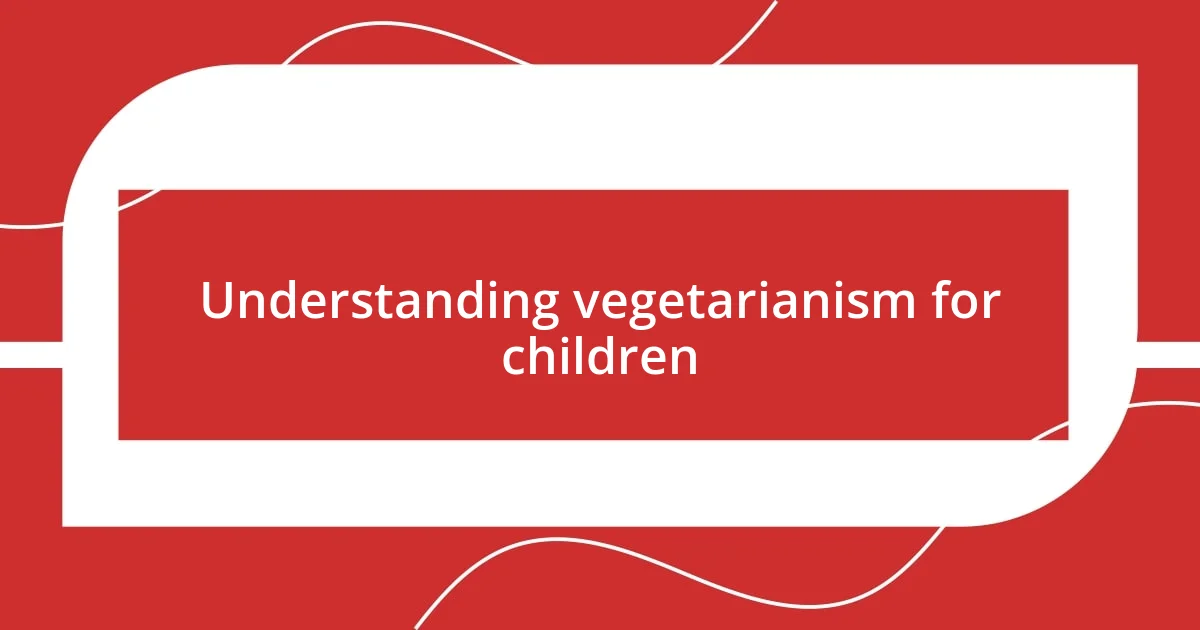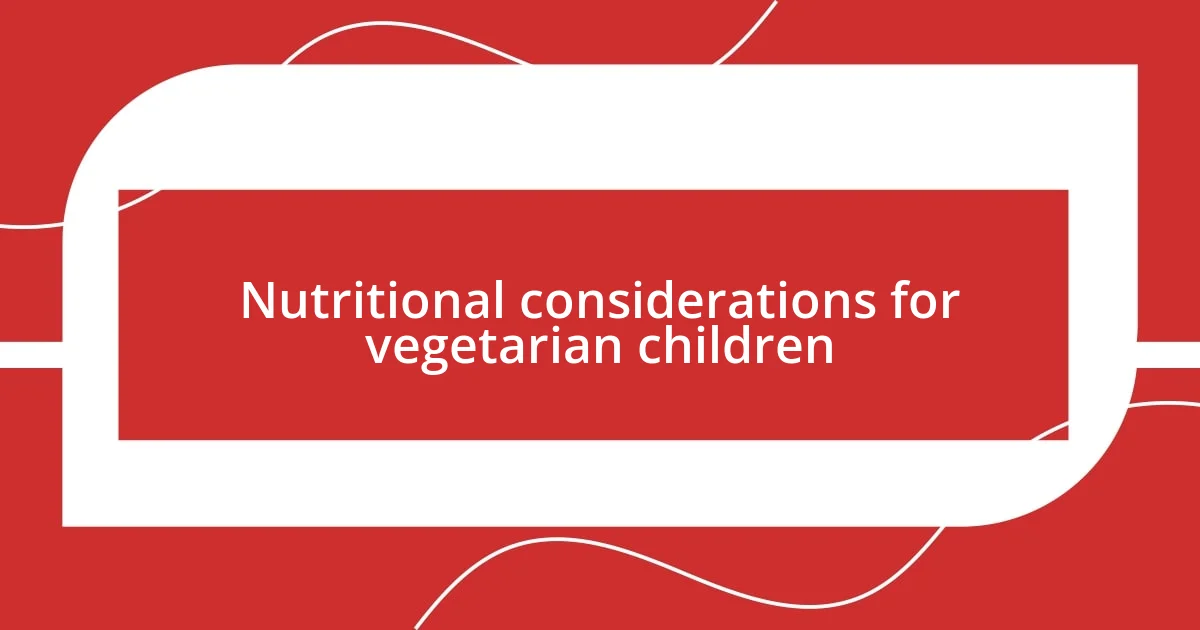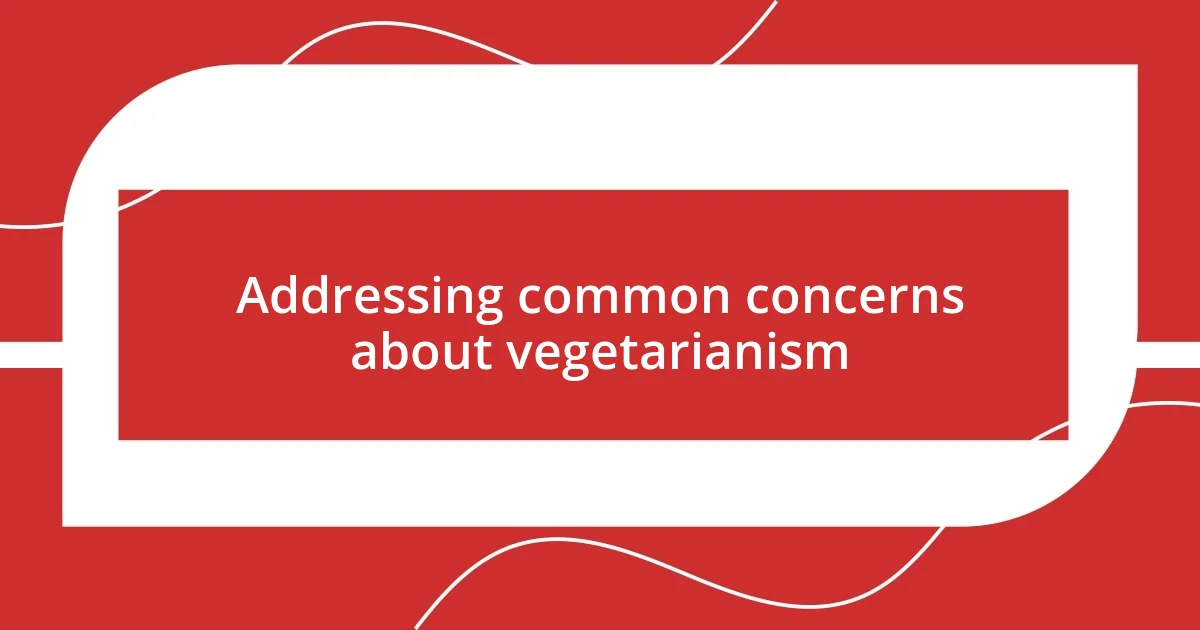Key takeaways:
- Proper nutrient planning is essential for vegetarian children to ensure they receive adequate protein, iron, calcium, and vitamin B12 for their development.
- Social situations can be challenging for vegetarian kids; providing appealing vegetarian options at gatherings can enhance inclusivity and encourage curiosity.
- Engaging children in gardening and cooking fosters a positive relationship with food, making them more willing to try new plant-based ingredients and meals.

Understanding vegetarianism for children
Understanding vegetarianism for children involves recognizing that their nutritional needs are unique and require thoughtful planning. From my experience as a parent, I’ve found that when children shift to a vegetarian diet, it can be an exciting journey of discovery. But, one question that often comes up is: how do we ensure they get all the necessary nutrients?
I remember when my niece, who was about six at the time, expressed her desire to become a vegetarian after watching a documentary. It was heartwarming to see her passion, but I also felt a pang of concern about her iron and protein intake. We had many discussions about foods that could provide these nutrients, like lentils and spinach, and it was incredible to watch her excitement as she learned to cook those dishes herself.
Many parents wonder about the potential challenges of raising vegetarian kids, especially in social settings. I often think about birthday parties where meat is the main dish. It’s vital to prepare your child to enjoy these gatherings without feeling left out, and I’ve found that packing a fun, plant-based meal not only keeps them nourished but can also spark curiosity from their peers. How can we make vegetarian options equally appealing and enjoyable?

Nutritional considerations for vegetarian children
When it comes to vegetarian children, it’s important to ensure they receive adequate nutrients that a meat-based diet might typically provide. I vividly recall a conversation with my friend, a nutritionist, who emphasized the key vitamins and minerals often lacking in vegetarian diets. She pointed out how essential protein, iron, calcium, and vitamin B12 are for growing kids. We can’t overlook these; they’re critical for development and maintaining health.
To keep things on track, here’s a brief checklist of vital nutrients for vegetarian children:
- Protein: Found in beans, lentils, quinoa, and tofu.
- Iron: Sources include spinach, chickpeas, seeds, and fortified cereals.
- Calcium: Dairy products, almond milk, kale, and broccoli are great options.
- Vitamin B12: Important for nerve function, found in fortified plant-based milks and nutritional yeast.
- Omega-3 fatty acids: Chia seeds, flaxseeds, and walnuts are great sources.
I also remember my own son’s fascination with smoothies filled with spinach and almond milk. When we started incorporating these ingredients into his favorite recipes, it felt like a win-win situation. He was not only getting his nutrients but also learning about healthy eating in a fun way. I believe that fostering this sense of curiosity and empowerment around food choices can work wonders for their overall relationship with nutrition.

Addressing common concerns about vegetarianism
Addressing the topic of vegetarianism in kids often brings up some common concerns from parents, particularly about nutritional sufficiency. I remember the first time my friend’s child transitioned to a vegetarian diet. As a parent, she was apprehensive, questioning whether her daughter would get enough energy for her after-school activities. It turned out that with the right balance of wholesome foods—like whole grains, nuts, and legumes—her energy levels soared, and she even performed better in her soccer games. This experience truly highlighted how well-planned vegetarian meals can support an active lifestyle.
Another concern that often arises is about social situations, like mealtime at school or birthday parties. Reflecting on my own childhood, I recall how I often felt left out when my friends indulged in things I couldn’t eat. I believe it’s crucial to empower kids to voice their preferences while teaching them adaptable choices. One weekend, when we hosted a birthday party, I created a refreshing vegetarian platter that even the picky eaters loved. The joy and excitement on their faces were contagious, proving that delicious vegetarian options can thrive even among carnivores.
Moreover, parents tend to worry about the willingness of children to try new plant-based foods. I’ve experienced firsthand the magic of planting a small garden with my kids where they can grow their own vegetables. Watching them care for the plants sparked their interest in cooking with fresh ingredients. This simple act not only encouraged them to taste everything but also made them proud of their contributions to the meal. The shift in their attitude towards vegetables was extraordinary, turning hesitation into curiosity and willingness.
| Concern | Solution |
|---|---|
| Nutritional Sufficiency | Incorporate a variety of energy-rich foods like whole grains and legumes. |
| Social Situations | Create appealing vegetarian options for gatherings to encourage inclusivity. |
| Willingness to Try New Foods | Involve kids in gardening and cooking to spark interest in vegetables. |

Meal ideas for vegetarian families
When it comes to meal ideas for vegetarian families, creativity in the kitchen can turn mealtime into a delightful adventure. One of my go-to recipes is stuffed bell peppers filled with quinoa, black beans, and a mix of vibrant veggies. The kids love choosing their favorite colors of peppers, and it’s incredible to watch them get excited about what’s on their plates. Have you ever seen a child beam with pride over their colorful meal?
On busy weeknights, I often whip up a veggie stir-fry with whatever produce I have on hand. I remember one evening, I threw together broccoli, carrots, and snap peas, tossing them with tofu and a splash of soy sauce. My kids not only devoured it but started asking for extra servings. It’s a joy to see how a little spontaneity can lead to such enthusiasm. Plus, it teaches them that healthy can be delicious, don’t you think?
Lentil tacos have also become a family favorite. We mash cooked lentils with spices and serve them in taco shells with toppings like avocado and salsa. The vibrant flavors not only please the palate but also introduce kids to the concept of international cuisines. I remember the first time we topped our tacos with mango salsa; the excitement in the room was palpable. It’s moments like these that reinforce how much fun vegetarian meals can be, turning even the pickiest eaters into enthusiastic diners.












